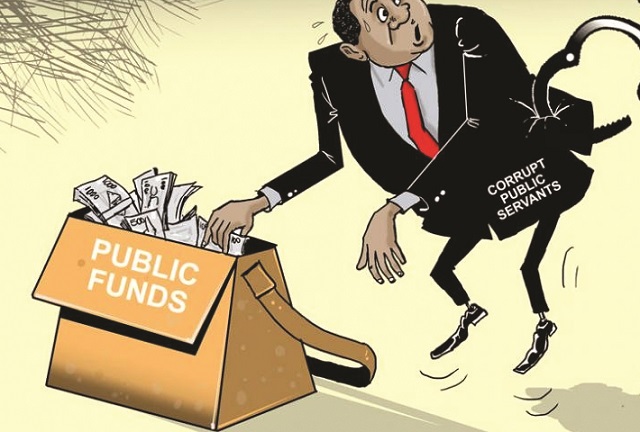
The Sunday News

Patrick Bhunu
IN today’s environment, companies (of all sizes) need to consider the risk of corruption which is rearing its ugly head and take proactive measures which are aimed at mitigating the risks associated with this vice.
Corruption can be defined as the abuse of an office or position of trust in order to gain an undue advantage. Corruption is one of the most dangerous diseases that, if left unchecked, can lead to the extinction of companies. It can aptly be described as a cancer that needs quarantining if we are to create a healthy society.
For years, corruption has been mainly attributed to those that hold public offices. In Zimbabwe, for example, people have been shouting at the top of their voices castigating corruption by public service providers. The Government also came up with the Anti- Corruption Act (Chapter 9:22) which establishes a body, the Zimbabwe Anti-Corruption Commission (Zacc), mandated to fight corruption by public officers and is administered under the Office of the President and Cabinet.
However, corruption is not only rampant in the public sphere but can also be perpetrated by individuals and business organisations in the private sphere. Corruption in business may involve misappropriation of company funds, misuse of office or authority by company officials, bribery, extortion and dishonesty in financial matters. This vice can have far reaching consequences to a business such as tarnishing the image of the business, resulting in total jeopardy of its profitability.
When a business organisation’s image is tainted, customers and the public get a negative picture about the organisation and what follows after is everybody’s guess. Customers and other stakeholders lose trust in the company and its products. Clients are lost, business is lost and business partners are lost. Losses are further incurred as the company tries to clean its image in an endeavour to reassure customers, suppliers and other stakeholders that it will stick to legal and ethical business practices.
Lawsuits may also arise from the company’s corrupt activities and this can as well signal the demise of the company.
Corruption also negatively impact on the business organisation’s efficiency. Resources that were meant for productive purposes end up being channelled towards unproductive and unrelated functions thereby reducing efficiency and increasing inequality. Inefficiencies lead to demoralised employees and we all know what happens when a larger section of the workforce is disgruntled.
One form of corruption which is prevalent in business organisations is bribery in the awarding of tenders and contracts. Bribery is a specific offence involving the practice of offering something, usually money, to gain an illicit advantage. More often than not, this practice has resulted in organisations engaging incompetent contractors who do not have the required competence for the task on hand. We have heard companies crying foul after being supplied with products that do not match the minimum specifications for their need. At the end of the day, if the organisation is a manufacturer for instance, it implies that the end product would also not match the required standard, thereby short-changing the customers and other stakeholders. In some instances the company will be forced to inflate prices in order to compensate for the losses incurred through corruption during procurement.
If corruption is perpetrated by employees in the human resources department, it simply means that incompetent and unproductive employees may be hired. Employees are the mirror images of their respective organisations and as such an organisation with incompetent personnel on key positions loses the confidence of the customers and the public. It takes a lot of time, effort and resources for such an organisation to rebuild its battered image or reputation, if ever it is going to win the people’s trust again.
Not only does corruption fuel organised crime, it is also one of the primary obstacles to the economic development of an organisation and the nation at large. It undermines the rule of law, and the rule of law is a prerequisite for any market economy.
Some of the measures that organisations may take in order to curb corruption among employees and senior managers is to carry out awareness campaigns aimed at informing their customers, suppliers and other stakeholders about the need to conduct business in a manner that respects the tenets of legality and ethics. Organisations should also ensure that their employees are familiar with the relevant corruption statutes (including their own code of conducts and ethics) and that they have adequate and valid credentials for the activities being undertaken.
Establishment of anti-corruption policies is a sure way of ensuring that all the employees are familiar with the relevant corruption laws and actions, their (employees) roles in the business, their responsibilities and the appropriate responses to any suspicious acts of a corrupt nature.
There is also need to establish some monitoring and reporting procedures. This may be done through a clear and accessible system for the reporting of any suspicious behaviour. One of the most effective tools of doing this is by crafting a whistleblowing policy. Whistleblowing is the reporting by employees on any matters of corrupt or illegal acts or failing to act within the provisions of the company requirements. It is meant to encourage employees to report suspected wrongdoing in the knowledge that their concerns will be taken seriously and investigated appropriately, and in a way that gives absolute respect to their confidentiality.
As a parting note, the identification and understanding of corruption is the first step towards its eradication. It is the responsibility of senior management to ensure that organisations fight to defeat this scourge which we can safely say is a primary impediment to economic growth.
Feedback on [email protected]/sms on 0716532802.



